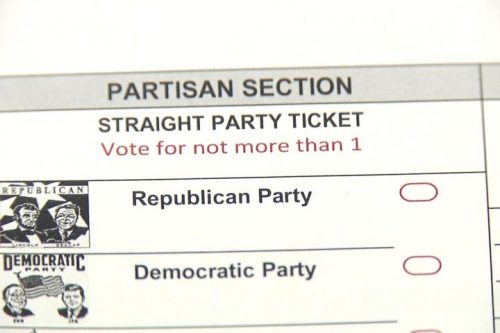
by Jay Wall
One casualty of the partisan rancor in the November elections was the Harris County judiciary. Sitting judges with integrity, high qualifications, and experience were booted out in an election where voter fatigue combined with straight ticket voting to create a Democratic sweep. The situation may well reverse in the mid-term elections when Republican turnout is typically higher and that is not good news, even for those who dislike the result this year. At the state level, Democratic judicial candidates face the same problem. While there certainly should be democratic checks on the courts, the rule of law is not served by a system that turns the judiciary into nothing more than political spoils. It’s time to consider a change for the system of selecting judges.
Fourteen judicial candidates endorsed by the Chronicle editorial board lost elections, many of them by very slim margins in this environment of straight ticket voting and voter fatigue. Over 66{997ab4c1e65fa660c64e6dfea23d436a73c89d6254ad3ae72f887cf583448986} of the votes cast in Harris County were straight ticket, with over 53{997ab4c1e65fa660c64e6dfea23d436a73c89d6254ad3ae72f887cf583448986} of those being Democrat straight ticket. The average judicial race had about 5{997ab4c1e65fa660c64e6dfea23d436a73c89d6254ad3ae72f887cf583448986} undervotes. In an election where the ballot went on for pages, those 5{997ab4c1e65fa660c64e6dfea23d436a73c89d6254ad3ae72f887cf583448986} who knew they didn’t know anything about the candidates were probably the most honest voters in the county.
Debra Ibarra Mayfield, lost her re-election bid by just over 1{997ab4c1e65fa660c64e6dfea23d436a73c89d6254ad3ae72f887cf583448986}. The Chronicle said, “the first Latina judge in the Harris County civil courts at law…[brought] a refreshing openness to the bench.
Clyde Raymond Leuchtag lost by just under 2{997ab4c1e65fa660c64e6dfea23d436a73c89d6254ad3ae72f887cf583448986}. The Chronicle said he had “the steady judicial temperament possessed by the best judges,” and his opponent said, “If I wasn’t running in this race, I’d probably vote for Clyde.”
Twenty year judge Mark Kent Ellis “demonstrated a willingness to learn and evolve on the job that should earn him another term.” It didn’t. Ellis lost by 1.5{997ab4c1e65fa660c64e6dfea23d436a73c89d6254ad3ae72f887cf583448986}.
For the typical voter, the list of judgeships to be voted on in Harris County makes real informed decision making difficult at best. Straight ticket voting is a decent proxy for knowing individual candidates in political races, but we expect a higher standard for judges and that requires a higher standard for their selection.
It’s time to consider a new method for selecting judges. One possibility worth considering is the Missouri Non-Partisan Court Plan. Under that plan a non-partisan commission sends the governor a list of candidates and the governor has 60 days to choose one. After a year in office, the judge faces an up or down vote at the next general election. If he is retained, he serves a full term. If not, a new slate of candidates is chosen by the commission. The plan has been in use in Missouri since 1940 and adopted by several other states, so there is ample experience to adopt an improved version.
Changing the system of selecting judges will require an amendment to the Texas Constitution, but it’s a change that is at least one election overdue. The Chronicle editorial board noted in one race that, “Justice shouldn’t be for sale,” and a review of judicial selection gives us an opportunity to assure that it isn’t. Whether it’s the Missouri Plan, non-partisan elections, longer terms, reducing the number of judgeships on the ballot, or some other method of simplifying judicial elections, this should be a priority for the next legislature.
J.W. “Jay” Wall is a commercial real estate broker, specializing in tenant representation.
